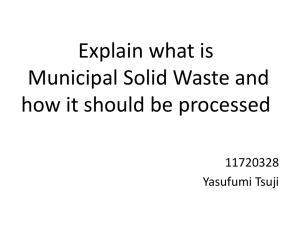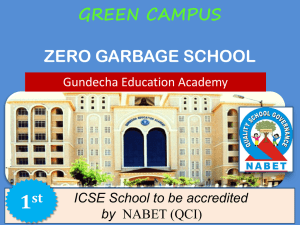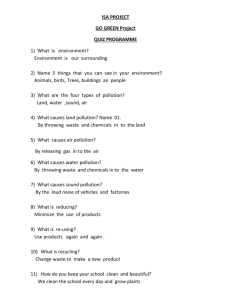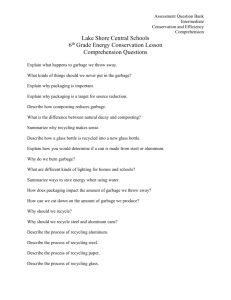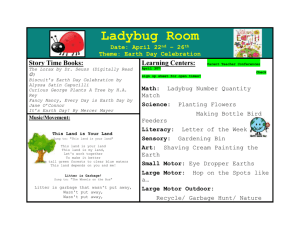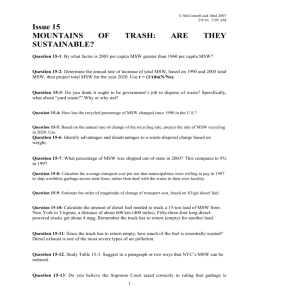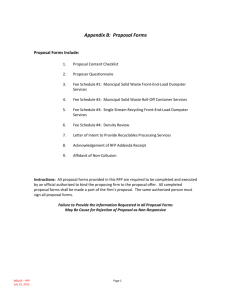Dr S R Maley, Consultant, Jyoti Build Tech Pvt Ltd
advertisement
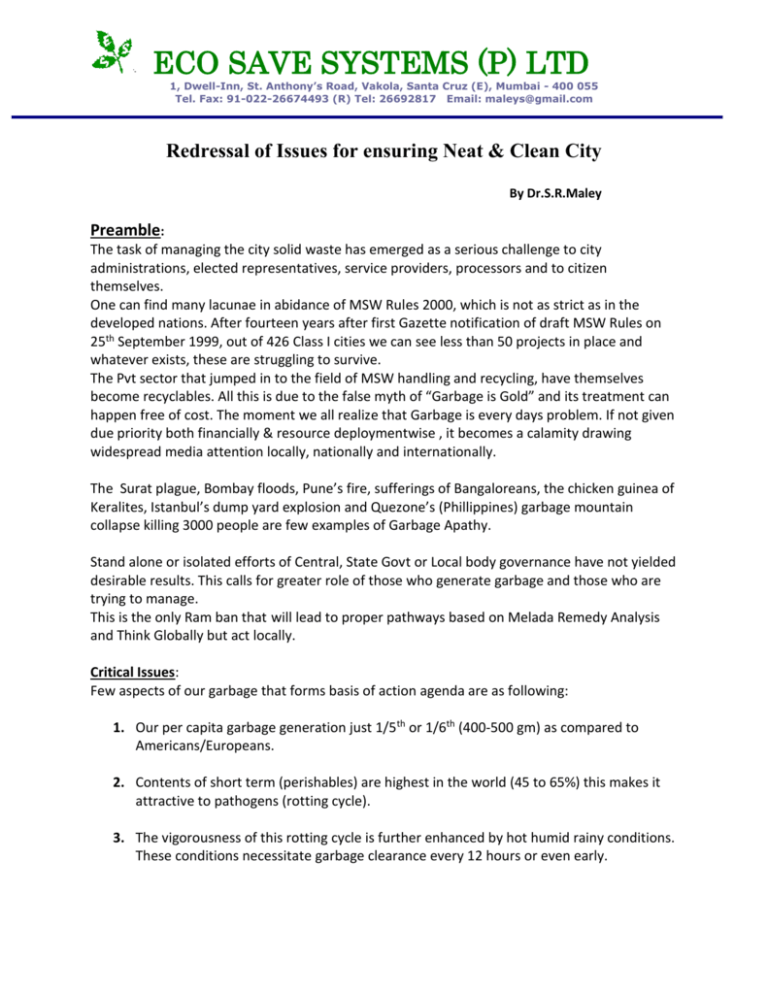
ECO SAVE SYSTEMS (P) LTD 1, Dwell-Inn, St. Anthony’s Road, Vakola, Santa Cruz (E), Mumbai - 400 055 Tel. Fax: 91-022-26674493 (R) Tel: 26692817 Email: maleys@gmail.com Redressal of Issues for ensuring Neat & Clean City By Dr.S.R.Maley Preamble: The task of managing the city solid waste has emerged as a serious challenge to city administrations, elected representatives, service providers, processors and to citizen themselves. One can find many lacunae in abidance of MSW Rules 2000, which is not as strict as in the developed nations. After fourteen years after first Gazette notification of draft MSW Rules on 25th September 1999, out of 426 Class I cities we can see less than 50 projects in place and whatever exists, these are struggling to survive. The Pvt sector that jumped in to the field of MSW handling and recycling, have themselves become recyclables. All this is due to the false myth of “Garbage is Gold” and its treatment can happen free of cost. The moment we all realize that Garbage is every days problem. If not given due priority both financially & resource deploymentwise , it becomes a calamity drawing widespread media attention locally, nationally and internationally. The Surat plague, Bombay floods, Pune’s fire, sufferings of Bangaloreans, the chicken guinea of Keralites, Istanbul’s dump yard explosion and Quezone’s (Phillippines) garbage mountain collapse killing 3000 people are few examples of Garbage Apathy. Stand alone or isolated efforts of Central, State Govt or Local body governance have not yielded desirable results. This calls for greater role of those who generate garbage and those who are trying to manage. This is the only Ram ban that will lead to proper pathways based on Melada Remedy Analysis and Think Globally but act locally. Critical Issues: Few aspects of our garbage that forms basis of action agenda are as following: 1. Our per capita garbage generation just 1/5th or 1/6th (400-500 gm) as compared to Americans/Europeans. 2. Contents of short term (perishables) are highest in the world (45 to 65%) this makes it attractive to pathogens (rotting cycle). 3. The vigorousness of this rotting cycle is further enhanced by hot humid rainy conditions. These conditions necessitate garbage clearance every 12 hours or even early. 4. All kind of waste collection schedules can be worked out provided that all household adopts two bin system (Wet waste: Dry waste). Wet waste requires quick lifting, dry waste can be on periodic basis. 5. There is need to get away from redundant collection storage & transportation system. This is one of the main culprits for city’s ugly look. A newly formed city corporation (Vasai Virar) has decided to get rid of hand arts, wheel barrows, tricycle rickshaws, dumper placer bins, auto rickshaws, tractor trolleys. All societies are given 240 lit. HDPE bins from which waste is collected in 4 wheeler Mini tipper, which in turn transfers waste into refuse compacters, which takes it to processing facility. Only at few pre identified places, 1100 lit. Movable bins are provided for waste dropping. 6. After lifting & shifting of the problem, a clean-city status is achievable but the job won’t be complete, unless we ensure “due treatment to major waste streams” and achieving up to 90% recycling. 7. Step 6th will not be successful, unless we give up the idea of total O&M cost recovery from sales revenue of MSW derived products. 8. Working economics of MSW processing plants reveal that only up to 30-35% of O&M cost can be compensated from sales revenue, balance has to come from Tipping Fee (Rs600.00 ± 100). Such Tipping requirement will further go up if Capex cost exceeds Rs10.00 lac/MT. 9. Under the current scenario, Indian garbage can never be treated or processed with one singular technology including incineration. Therefore MSW treatment facility has to have multiple product recovery systems. The climatic seasons add further difficulties to waste processing. 10. Use of land is a necessary evil for MSW facilities, every one tonne of waste requires 20 Sqm land for its processing treatment per cycle of rapid composting or 5 Sq m for RDF cycle. But when you encourage composting, every one Sq m land use in city nourishes 1467 Sq m of farm land per year and in 30 years contract, this 44000 Sq m. With RDF and incineration, no such benefit is obtained; on the contrary, you spoil lot of peri urban land by disposal of ash. 11. Most of the ULBs are currently spending in per kg of waste Rs 0.50 on sweeping, Rs0.46 on D to D collection and Rs 1.20 on its transportation (Total Rs2.16). The processor is spending Rs1.54, out of which usually Rs 0.54 is recoverable from compost and Rs 0.35 from recyclables (if brought to the facility).Thereby leaving a deficit of Rs 0.65. If we consider cost of land for waste storage processing and SLF, this works out to Rs1.33 to house holds, Rs9.60 to Govt (land) for processing and Rs 0.84 for SLF. 12. Question arises as to when ULB/Govt land cost rental value of Rs 10.44 on per kg MSW is at stake, then why one should resist in contributing Rs0.65/kg of MSW for its efficient recycling and achieve the status of “Most clean environmentally sound Fast Forward city”. 13. Examples across the world reveals that waste management model cannot be rigid, it has to be flexible as per local needs. Each city administration has to have its waste management hierarchy as per best practicable environment option, it should motivate the environmental impact of their activities. 14. The developed nations now claim that they collect wastes, we throw wastes? Some of them like Sweden have achieved up to 97% recycling rate, In India we are just at around 15-20%. What is missing is watch dog role both collection & transportation level and Processing & Disposal level. City Managers & citizens have to develop this mechanism. 15. Last thing is that garbage does not need a rocket science. The problem is created by mixing it, it solved by separating it.
